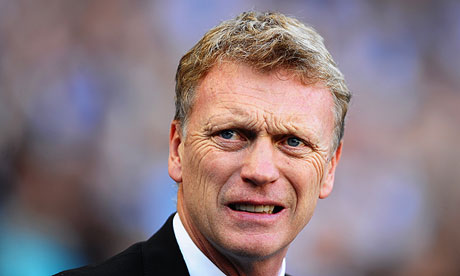Time for a change?
I wrote this piece a while ago, then due to life events in their various forms getting in the way it was never 'properly' submitted and thus I have no idea if it ever made it to print. Anyway, here it is (dated though it now is):
It’s fair to say David Moyes hasn’t had a dream start at Old
Trafford. Whether it’s entirely fair to lay all the blame for Manchester United’s
underperformance this season at his door, the reality is that the reigning Premier
League champions look like a long shot to even qualify for next season’s
Champions’ League. This would be quite the comedown for anyone, but especially
so for United’s success-obsessed supporters. And so, as is the modern custom,
certain fans are already calling for Moyes’s head.
Managers never used to change this much. How we used to
laugh at the continentals and their high-speed coaching merry-go-rounds! And
yet, now English fans are used to such phenomena as seven firings in one
eight-day period, which happened in late November-early December, it’s becoming
increasingly hard to remember those calmer, more certain days.
As far back as the 2003–04 season there were 44 managerial
changes in the football league alone, suggesting that it’s hardly a new phenomenon.
Last season, with 63 such reshuffles, did feel like a nadir though - especially
in the Championship with the likes of Blackburn’s Venky’s and Nottingham
Forest’s Kuwaiti owners engaging in a bizarre game of P45-ing one-upmanship.
That Henning Berg and Michael Appleton were given just 54 and 67 days
respectively at Ewood Park does give credence to the argument that the new
breed of owners are to blame.
Since football clubs started to be run as big businesses,
many rich men have attempted to grab themselves a piece of the financial pie. Men
like Vincent Tan, who cheerfully admitted to knowing diddly-squat about the sport
before treating himself to Cardiff City. Some might say he proved that with his
supervillain approach to relations with poor Malky Mackay. On the other hand, maybe
Tan has learned where the balance of power in modern football lies all too
quickly.
With so much TV money at stake, when finishing one place
higher in the Prem brings nearly a £million worth of extra dough, patience with
poor results is becoming less and less of an option. Of course, modern
contracts being the size they are, giving your boss the boot costs money too –
Andre Villas-Boas has pocketed a reported £16 million from terminated contracts
at two big London clubs (although whether it sweetens the pain of all those
relentless media savagings is debatable). So presumably chairmen must see a
sacking as a case of speculating to accumulate. But what if the new boss turns
out to be no better than that last reprobate?
In their book The Numbers Game, Chris Anderson and David
Sally discuss the phenomenon known as regression to the mean. In football
terms, any team can suffer a bad patch of form and many chairmen will wield the
axe if this period lasts for long enough. Such teams often experience an
initial bounce-back with a new man in charge
(or even a caretaker), but statistics suggest that these upswings tend
to happen anyway with or without the managerial switch.
Sunderland took action last season when results nosedived
under Martin O’Neill, swapping him for the excitable Paolo di Canio who did just
enough to keep them up, a 3-0 derby win over Newcastle never really being built
upon. Would O’Neill have got similar results had he been given the chance to
recover from the slump and regress to the mean? He certainly wouldn’t have
decimated and then alienated the entire squad like Paolo then did. Arguably, after
yet another upheaval Sunderland are worse off now than when the Ulsterman was
dumped.
Now compare and contrast with Paul Lambert at Aston Villa.
Randy Lerner kept the faith in his man, and the team’s wretched form eventually
returned to comfortable mediocrity.
For a longer-term example of fluctuations in form, consider Alan
Pardew. After a bright start at Newcastle he suffered a nightmare second season
after which even he admitted he was lucky to keep his job. But Newcastle look
like a different team again this term, suggesting that the last campaign was more
of an extended blip. (Pardew would also point to the lack of additions to the
squad in the preceding summer and the pesky Europa League as mitigating factors.)
However esoteric some of Mike Ashley’s decisions have been -
not performing due diligence before purchase, employing Joe Kinnear, renaming
the stadium, employing Joe Kinnear again - his patience with Pardew seems to be
bearing fruit. Maybe, after giving Pardew that gargantuan 8-year contract,
Ashley found himself financially unable to give him the chop. Whether by luck
or judgment though, Newcastle point the way to a saner, more secure football
future.
Look at Leicester City too. Nigel Pearson returned in
November 2011 to clean up the mess of the Sven era and led the big-spending
club to finishes of 9th and 6th. For whatever reason,
perhaps weary at enforcing yet another change, the club’s Thai owners sat tight
and City are now in pole position for promotion.
Not that such patience is always rewarded. Steve Gibson at
Middlesborough was always given credit as a chairman whose trigger finger
remained commendably un-itchy, but Bryan Robson got them relegated once and
would have done so again had Terry Venables not been parachuted in to ‘help’ (ie
take charge) in late 2000. Sometimes managers simply go stale at a club - few
questioned Stoke’s decision to replace Tony Pulis with Mark Hughes this summer.
Meanwhile, my beloved Wolves hung onto Mick McCarthy as we scrapped around the
Premiership’s nether regions, finally getting rid of him in 2011 long after the
January transfer window had shut and with no clue who to employ next. Oddly
enough, it didn’t work out so well.
Patience is futile too if you appoint the wrong man in the
first place, or if the chairman decides to completely undermine him (hello
again, Mr Tan). Planning and long-term strategy are essential, with clubs like
Swansea showing the way by imposing a certain playing style and only employing
coaches who fit that mould. West Brom run a similar model and with more clubs
following suit, the Director of Football structure looks to be here to stay. Perhaps
in years to come the managerial role will become a much smaller cog in a giant
business machine, with pay rates adjusted accordingly.
Not that all this is of much help to poor David Moyes at the
moment. He might at least count himself lucky that his new club famously kept
the faith with Sir Alex Ferguson during an underwhelming first few years. Even
then, it took a late Mark Robins goal in the FA Cup third round to save him
from the sack.
Moyes could also point to his old chairman Bill Kenwright,
who backed him through a sticky start, after which Everton duly became an
established top six club. But can he rely on his new bosses to give him similar
time? Success breeds success, and most fans pour scorn on phrases like
‘project’ and ‘rebuilding period’. Back in 1990 there were hardly the same
financial or media pressures. The suspicion remains that had Fergie made that
bad start in the Premier League era, he’d have been long gone before Mr Robins even
entered the picture.
One thing’s for sure – if Moyes goes, he’ll be a good few
quid better off. And his replacement, like the vast majority of his fellow
managers, is unlikely to feel any more secure in the job.




Comments